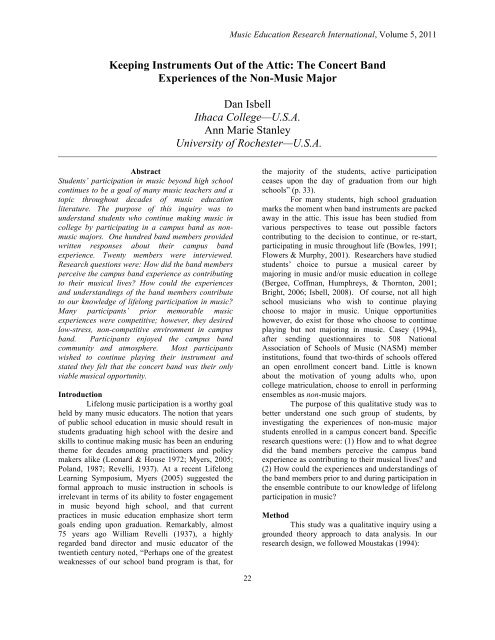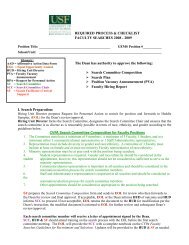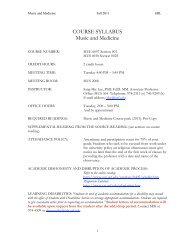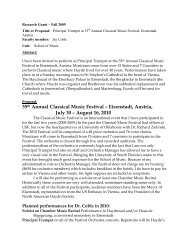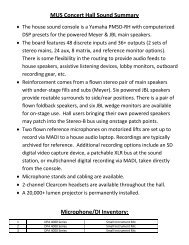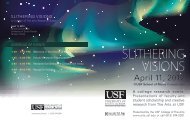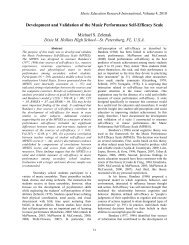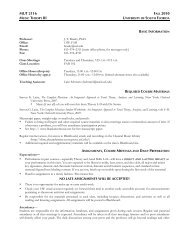Keeping Instruments Out of the Attic: The Concert Band Experiences ...
Keeping Instruments Out of the Attic: The Concert Band Experiences ...
Keeping Instruments Out of the Attic: The Concert Band Experiences ...
Create successful ePaper yourself
Turn your PDF publications into a flip-book with our unique Google optimized e-Paper software.
Music Education Research International, Volume 5, 2011… where more than one person is working on<strong>the</strong> analysis, it is helpful to have each persondevelop <strong>the</strong> coding scheme independently, <strong>the</strong>ncompare and discuss similarities anddifferences. Important insights can emerge from<strong>the</strong> different ways in which two people look at<strong>the</strong> same set <strong>of</strong> data, a form <strong>of</strong> analyticaltriangulation. (p. 464)Using <strong>the</strong> coding strategies suggested byPatton (2002), we began by looking for “recurringregularities” (p. 465), or patterns, within bits <strong>of</strong> <strong>the</strong>respondents’ answers that we <strong>the</strong>n sorted intocategories. As recurring regularities occurred, we put<strong>the</strong>se bits <strong>of</strong> data into categories, constantly asking,“What does this answer mean in terms <strong>of</strong> thisperson’s experience in Campus <strong>Band</strong>?” Next, stillseparately, we sorted through <strong>the</strong> bits <strong>of</strong> data that wehad divided into categories and checked to see if <strong>the</strong>yseemed consistent, inclusive, and credible (Guba,1978). We <strong>the</strong>n traded our lists <strong>of</strong> categories, and <strong>the</strong>data bits within, to see if <strong>the</strong>y were “reproducible byano<strong>the</strong>r competent judge … verify that (a) <strong>the</strong>categories make sense … and (b) <strong>the</strong> data have beenappropriately arranged in <strong>the</strong> category system … <strong>the</strong>category system ‘fits’ <strong>the</strong> data and that <strong>the</strong> data havebeen properly ‘fitted into’ it” (Patton, 2002, p. 466).After creating <strong>the</strong> category system using <strong>the</strong>questionnaire data, we used <strong>the</strong> interview transcriptsas data and categorized participants’ responses in <strong>the</strong>same way. Co-mingling questionnaire and interviewdata helped us create a fuller picture <strong>of</strong> <strong>the</strong> campusband experience for <strong>the</strong>se participants. We havecollapsed our categories into larger subsets, which wesyn<strong>the</strong>size in <strong>the</strong> Findings section.24FindingsParticipantsWe considered ways in which we mightexplore important elements <strong>of</strong> <strong>the</strong> participants’musical lives. We thought learning more about <strong>the</strong>irmost memorable musical experiences would be a wayto begin to understand <strong>the</strong> satisfaction and motivationunderlying <strong>the</strong>se students’ participation in musicalactivities. One <strong>of</strong> <strong>the</strong> ways we attempted to gleaninformation about our participants was by prompting<strong>the</strong>m to describe in writing <strong>the</strong>ir “most memorablemusic experience,” in- or out-<strong>of</strong>-school: <strong>the</strong> firstquestion on our questionnaire. We found it importantto keep in mind that “most memorable” does notnecessarily equate to a memory that is “favorite” or“most enjoyable.” We thought asking for <strong>the</strong>ir mostmemorable experience would help us identifyunforgettably important moments in <strong>the</strong>separticipants’ lives, ra<strong>the</strong>r than <strong>the</strong> more run-<strong>of</strong>-<strong>the</strong>milltypical positives and negatives that occur indaily experiences. To present a fuller picture <strong>of</strong> <strong>the</strong>campus band participants, we chose to analyze <strong>the</strong>irwritten responses to this first question in detail. In <strong>the</strong>next section we explain and quantify <strong>the</strong>ir answers to<strong>the</strong> prompt: “Describe your most memorable musicexperience (can be in- or out-<strong>of</strong> school).” This isfollowed by <strong>the</strong> findings related to each researchquestion, organized <strong>the</strong>matically.Most memorable musical experiences: out<strong>of</strong>-school.Thirty-six participants cited an out-<strong>of</strong>schoolcontext for <strong>the</strong>ir most memorable musicalexperiences. We defined out-<strong>of</strong>-school groups as anyensemble that was not part <strong>of</strong> <strong>the</strong> typical school dayor dependent upon enrollment in school groups (i.e.,honor bands). <strong>The</strong>se out-<strong>of</strong>-school experiences weremostly oriented toward large-ensemble participation,and <strong>of</strong>ten had an aspect <strong>of</strong> competition and/orselectivity: “I was selected part <strong>of</strong> <strong>the</strong> AmericanMusic Abroad tour … earning <strong>the</strong> solo.” <strong>The</strong>majority described performing groups that went ontour to special places, competed in special events, orplayed exceptional repertoire. In <strong>the</strong>se selectiveensembles, membership was <strong>of</strong>ten sought out by <strong>the</strong>musicians <strong>the</strong>mselves, and <strong>the</strong> purpose was specificand goal-oriented, as in: “Playing in Carnegie Hallwith my youth orchestra and traveling to <strong>the</strong> Far Eastand Europe for charity tours.”Several participants said <strong>the</strong>ir mostmemorable musical experience had been performingin <strong>the</strong>ir hometown community bands. Only a fewparticipants cited experiences that exist outside <strong>the</strong>large ensemble, for example, gigging with a rockband, taking private lessons, recording in a studio, orperforming at a nursing home. Two participants said<strong>the</strong>ir most memorable musical experience had beenattending a concert.Most memorable musical experiences: inschool. Sixty-one participants described <strong>the</strong>ir mostmemorable musical experience as in, or related to,formal music education in school. Note thatresponses did not total 100 as some did not answer allquestions and some gave more than one answer. Afew students merely cited being a part <strong>of</strong> a group asmemorable: “being in high school band,”“performing in general and getting to make music,”“playing in marching band in high school wasamazing,” or “playing in jazz band.”Thirty-nine <strong>of</strong> <strong>the</strong>se 61 memorable in-schoolexperiences related to being adjudicated or winningcompetitions: “My high school band scored anoutstanding rating for <strong>the</strong> first time in five years andour school won best overall” or “At a heritage musicfestival, we took first place twice.” Twenty-one wrotespecifically about competitive marching band as <strong>the</strong>ir
Music Education Research International, Volume 5, 2011most memorable musical experience thus far, forexample: “Winning State Champions with mymarching band my junior year <strong>of</strong> high school” or “Iloved when our marching band in high school broke arecord score.”Sixteen participants wrote about specificperformances, pieces, or venues as most memorable.Some <strong>of</strong> <strong>the</strong>se overlap with <strong>the</strong>adjudication/competition category, as in: “playing inFestival … it was a very challenging piece and wehad just perfected it after nine months <strong>of</strong> practice”and “marching at Disney World at night with myhigh school marching band.” However, somerespondents described concerts as memorablebecause <strong>of</strong> repertoire or venue: “performing atSymphony Hall,” “playing ‘Stars and Stripes’ on <strong>the</strong>piccolo,” or “playing percussion in <strong>the</strong> pit orchestraalongside pr<strong>of</strong>essionals for our high schoolproduction <strong>of</strong> ‘West Side Story.’” In this category,we are also including those participants (11) whoindicated that <strong>the</strong>ir most memorable experience wasperforming in auditioned, all-state or -county solo orgroup festivals in this group, as membership wasusually reliant on <strong>the</strong> participant being member <strong>of</strong> aschool music organization: “for several years I wasselected to play in <strong>the</strong> Area All State <strong>Band</strong>/Orchestra.It was fun getting to play with dedicated musicians.”Research Question One. How and to what degree did<strong>the</strong> band members perceive <strong>the</strong> campus bandexperience as contributing to <strong>the</strong>ir musical lives?In answering this question, we found <strong>the</strong>most frequently occurring answers could be collectedinto four categories. <strong>The</strong> band members credited <strong>the</strong>campus band experience for contributing (a) joy andbeauty, (b) skills and understanding, (c) a musicalopportunity, and/or (d) a positive atmosphere to <strong>the</strong>irmusical lives.Joy and Beauty. When asked <strong>the</strong>ir primaryreason for joining Campus <strong>Band</strong>, or what <strong>the</strong>y likedmost about it, participants most frequently gaveanswers that we coded “love to play.” <strong>The</strong>se indicatea strong fondness for music, for <strong>the</strong>ir specificinstruments, or for playing music in general or in alarge ensemble: “I really enjoy music and playing mytrumpet whenever I have <strong>the</strong> time;” “I like music, Ilike playing;” “Playing in a large ensemble is myfavorite activity;” and “I love being in a band and Ilove music.” When asked to share <strong>the</strong>ir expectationsfor <strong>the</strong> coming year in Campus <strong>Band</strong>, typical answerswere, “Play fun pieces and have fun while playingmusic;” “To have fun and continue playing;” and “Ihope to have a fun, enjoyable, musical experience.”Beyond having fun, participants alsoprovided deeper, more meaningful explanations <strong>of</strong>25how campus band contributed to <strong>the</strong>ir musical lives.A frequent appearance in <strong>the</strong> coding was what welabeled “<strong>the</strong> potential for an aes<strong>the</strong>tic musicalexperience,” which to us indicated <strong>the</strong> desire <strong>of</strong>participants to have satisfying musical encounters.For example, to <strong>the</strong> question “What suggestions doyou have for Campus <strong>Band</strong>?” one participantresponded, “to be more emotionally connected to <strong>the</strong>music;” o<strong>the</strong>r participants were less specific butwrote about “having good rehearsals,” “playingbeautiful music,” and “mak[ing] some good music.”Follow-up interviews with selectedparticipants confirmed <strong>the</strong>se ideas <strong>of</strong> joy and beauty.For example, we asked one participant what had beenso enjoyable about campus band for her. She said:It was incredibly fun. <strong>The</strong> best part I liked aboutit was performing. I really do enjoy getting upon stage. So it’s fun to be able to take an entiresemester’s worth <strong>of</strong> work and be able to be on[Name] Hall stage, which is kind <strong>of</strong> rare for anon-music major.Ano<strong>the</strong>r participant said, “[<strong>the</strong> conductor]conducted about loving <strong>the</strong> music. He made it so thatwe would be more passionate about <strong>the</strong> music. And Iloved that.”Skills and Understandings. A large number<strong>of</strong> participants wrote on questionnaires about <strong>the</strong>desire to not just “keep playing” but improve <strong>the</strong>irskills on <strong>the</strong>ir instruments or <strong>the</strong>ir musical knowledgebase: “I hope to improve my flute skills and tone,”“Continue to grow as a musician,” “To get myfingers back in gear,” “To develop better techniqueand to practice more to be able to play with moreconfidence,” and “Grow on my instrument andencounter a wide variety <strong>of</strong> music and composers.”O<strong>the</strong>rs seemed to be content with merelymaintaining <strong>the</strong>ir ability on <strong>the</strong>ir instrument: “Keepup my skill level,” “Keep playing at a recreationallevel,” and “I just want to make music and maintainmy skill level.” In interviews, participants described<strong>the</strong> campus band as a group where both groups <strong>of</strong>students, those highly motivated and <strong>the</strong> morerecreational, can coexist quite successfully: “It wasprobably comparable as far as skill level to a highschool level band. So it is really a welcomingenvironment for anyone <strong>of</strong> any skill level.” Ano<strong>the</strong>rparticipant said:I can miss a note or two because I’m pretty suresomebody in this room is missing one. It wasjust comfortable being around people that arenot bringing perfection to <strong>the</strong> band … <strong>The</strong>music was <strong>the</strong> appropriate level, and this is <strong>the</strong>
Music Education Research International, Volume 5, 2011only opportunity that I have to pull <strong>the</strong> clarinetout <strong>of</strong> its case every week.Opportunity. In a number <strong>of</strong> cases,participants wrote that campus band had become part<strong>of</strong> <strong>the</strong>ir musical lives because it was convenient,easy, and accessible to non-music majors: “I forgot toaudition for [ano<strong>the</strong>r] ensemble,” “It’s an Easy A,”“Campus <strong>Band</strong> fits in my schedule this year,” and “Idon’t have time to devote to any <strong>of</strong> <strong>the</strong> higher musicensembles.” In an interview, we asked a participantto elaborate more on why he joined campus band. Hementioned his major, and scheduling: “<strong>The</strong> reasonwhy I enjoy campus band is because I majored in <strong>the</strong>sciences. <strong>The</strong> reason I’m not in ensembles regularlyis that I am in <strong>the</strong> lab or science building most days<strong>of</strong> <strong>the</strong> week.” He said he enjoyed <strong>the</strong> once-a-weekrehearsal pace with 16 weeks to prepare a concert.Ano<strong>the</strong>r participant in an interview said:I really need to play my instrument and feelempty without playing my instrument. Playingin campus band definitely helped me to fulfillthat. And I knew when I came to [Name]College that I wanted to try out for one <strong>of</strong> <strong>the</strong>major ensembles or play in campus band, andcampus band is what fit into my schedule, so Iwas very thankful to have that and will continueto use it whenever I can.Atmosphere. Returning members <strong>of</strong> campusband frequently credited <strong>the</strong> relaxed atmosphere assomething <strong>the</strong>y liked most, writing comments like:“It’s very open and engaging,” “It’s a way for me tokeep playing without having to stress,” and “I loveplaying … but not at <strong>the</strong> level <strong>of</strong> an intense band.”Many participants wrote about <strong>the</strong>ir desire for abalance between challenge or competition and asupportive atmosphere, as in one participant whowrote she expected to “be challenged, but notstruggle.” Similarly, ano<strong>the</strong>r musician desiring hardermusic, also indicated that she expected “relaxed, lowstressrehearsals.” <strong>The</strong> “fun, not too stressful, buthigh expectations” sentiment was expressedfrequently.We asked several participants in follow-upinterviews to explain what <strong>the</strong>y meant by “lowstress”and why it is desirable. One said:I feel like it [<strong>the</strong> stressful nature <strong>of</strong> his previousexperiences] was <strong>the</strong> expectations … <strong>the</strong> stress<strong>of</strong> having to prepare a concert. <strong>The</strong> expectationsfor <strong>the</strong> Campus <strong>Band</strong> was to come in, you playas well as you can and that’ll be our concert. Idon’t even recall if <strong>the</strong>re was a grade attachedto it, but you weren’t in campus band for a26grade, you were in <strong>the</strong>re because you wanted toplay.Ano<strong>the</strong>r participant stated:It’s just more low key. <strong>The</strong> challenges <strong>of</strong> <strong>the</strong>music fit into that very nicely. On our first runthroughs,I was missing notes. I had to practiceonce or twice or multiple times depending on<strong>the</strong> piece. At <strong>the</strong> same time, it wasn’t like I wasslaving over it, and I didn’t feel that pressurethat I had to get everything right.Research Question Two. How could <strong>the</strong> experiencesand understandings <strong>of</strong> <strong>the</strong> band members prior toand during participation in <strong>the</strong> ensemble contributeto our knowledge <strong>of</strong> lifelong participation in music?In answering <strong>the</strong> second research question,we found most <strong>of</strong> <strong>the</strong> data related to <strong>the</strong> bandmembers’ continued participation in music fell intoone <strong>of</strong> three categories: (a) participants’ comfort andfamiliarity with, even nostalgia for, <strong>the</strong> band genre;(b) <strong>the</strong>ir satisfaction with being a part <strong>of</strong> a musicalcommunity; and (c) <strong>the</strong>ir strong desire to keepplaying <strong>the</strong>ir instruments.Familiarity, comfort, or nostalgia. Notsurprisingly, specific band experiences weredescribed in detail when participants were asked toshare <strong>the</strong>ir most memorable experience. Beyond that,it was also not uncommon for participants to recallfond memories <strong>of</strong> past band experiences when askedto share <strong>the</strong>ir primary reason for joining: “I playedthroughout high school, I need band in my life;”“<strong>Band</strong> was my favorite class in high school;” and “Iloved concert band in high school” were commonresponses.Participants also seem to see <strong>the</strong> campusband as an opportunity to recreate or replicate <strong>the</strong>seformer band experiences, as in <strong>the</strong> participant whowrote: “I dropped band in 8th grade and alwaysregretted it,” or <strong>the</strong> band member who wrote, “it[band] was hard in high school because not manypeople cared.” Ano<strong>the</strong>r participant, in response to <strong>the</strong>question, “what do you like most about campusband?” wrote, “it reminds me <strong>of</strong> my high school bandexperience, which I do miss at times.” When askedwhy <strong>the</strong>y wanted to join, participants frequentlylisted <strong>the</strong> ensembles that <strong>the</strong>y were a part <strong>of</strong> in <strong>the</strong>past, as in this response: “Throughout middle schooland high school I’ve been a part <strong>of</strong> marching band,jazz band, and concert band.” For many people, <strong>the</strong>primary reason for joining <strong>the</strong> group was <strong>the</strong> fact that<strong>the</strong>y’ve done it for a long time; as one person wrote,“it’s because I’ve played in band since fourth grade!”
Music Education Research International, Volume 5, 2011In an interview, a participant said band inhigh school filled an important niche, and that ifcampus band weren’t available to her a void wouldopen up:I would miss <strong>the</strong> opportunity to be able to play.Part <strong>of</strong> high school, playing <strong>the</strong> flute and beingin band made a world <strong>of</strong> difference in makingfriends and how my whole high school was.<strong>The</strong> flute was a part <strong>of</strong> my life all throughouthigh school, and it’s just been a part <strong>of</strong> me that Ireally enjoy. <strong>The</strong>re would be somethingmissing.Community. Many participants voiced anappreciation or desire for <strong>the</strong> element <strong>of</strong> community<strong>the</strong>y associate with playing in band, which oneparticipant described as “feeling <strong>the</strong> familyatmosphere.” Ano<strong>the</strong>r wrote, “I love <strong>the</strong> atmospherein campus band. People keep <strong>the</strong> spirit <strong>of</strong> <strong>the</strong> bandalive.” Some participants cited existing friendshipsas a plus: “I enjoy being in an ensemble with myfriends.” O<strong>the</strong>rs stated <strong>the</strong>ir wish to meet o<strong>the</strong>rpeople with similar interests: “it brings toge<strong>the</strong>rpeople from all majors across campus to meet people<strong>the</strong>y may not have ever run into” and “[I like] <strong>the</strong>chance to play with o<strong>the</strong>r people who love music andenjoy playing it!” A more ineffable aspect <strong>of</strong>community, that <strong>of</strong> being a part <strong>of</strong> something biggerthan one individual, seemed to be verbalized byparticipants in responses like, “I just always enjoyperforming and just playing with a group <strong>of</strong> peers,”and those who looked forward to “playing new musicwith a new group <strong>of</strong> people,” “hearing <strong>the</strong> ensembledevelop as a whole,” and “just enjoying <strong>the</strong>ensemble.”In an interview, one participant talked aboutmeeting people in campus band:It [knowing people in campus band] made itmore fun, and we could all relate to things.After <strong>the</strong> next semester, I had kids from campusband in one <strong>of</strong> my classes, so I knew <strong>the</strong>m andthat was good.Desire to continue. As indicated in much <strong>of</strong><strong>the</strong> data already described, many participants have asincere interest in continuing to play <strong>the</strong>ir instrumentafter leaving high school, but not commit to major inmusic in college. A total <strong>of</strong> 57 participants mentionedspecifically that <strong>the</strong>ir primary reason to play was to“continue to play [<strong>the</strong>ir] instrument.” This <strong>the</strong>me wasmore prevalent than any o<strong>the</strong>r that emerged during<strong>the</strong> coding process.27It was not uncommon for a participant towrite that not only do <strong>the</strong>y wish to continue playing<strong>the</strong>ir instrument, but that <strong>the</strong>y “miss having music inmy life,” “want to keep music in my life,” or “needmusic in my life.” <strong>The</strong>se responses may suggest thatcampus band is <strong>the</strong> only opportunity for <strong>the</strong>m to play<strong>the</strong>ir instrument and without campus band, <strong>the</strong>y feel<strong>the</strong>y would lose music, as in, “I love playing, and Ireally didn’t want to have to give it up.” O<strong>the</strong>rexamples <strong>of</strong> <strong>the</strong>se type <strong>of</strong> responses are: “I want tokeep making music and not lose touch with makingmusic,” “I love music and can’t see myself notcontinuing to play,” “I love to play <strong>the</strong> flute and needto keep music in my life,” and “I can’t imagine mylife without music.”Follow up interview data provided additionalinformation on this finding. One participant wrote onhis questionnaire, “Need an ensemble to play in. Imiss music in my life.” We asked him to explain, andhe talked about why music is important to him:I do not have <strong>the</strong> opportunity to play backhome. Being in band just helps me use o<strong>the</strong>rparts <strong>of</strong> my brain. I think it balances me out androunds me out as a person. Playing in band isfun. It’s something I can do to relax.Ano<strong>the</strong>r participant stated campus band was <strong>the</strong> onlyway she knew to keep up on her instrument:I think I enjoyed <strong>the</strong> most, just being able tokeep up with playing my instrument because if Ihadn’t done that [campus band] I wouldn’t havehad any o<strong>the</strong>r way to keep playing. And I’vebeen playing since 3rd grade.One participant said in an interview that heknew how to play in bands, and on trips home couldseek out <strong>the</strong> bands with which he formerly played,but had little additional outlets at college forperforming:I always have <strong>the</strong> opportunity to play with <strong>the</strong>groups that I played with during high schoolwhen I’m at home. So I have a very similaropportunity for me at home, but definitely notany o<strong>the</strong>r opportunities like that for me atschool.DiscussionAnalyses from both <strong>the</strong> written responsesand follow up interviews provide evidence that <strong>the</strong>campus band is indeed a special opportunity for <strong>the</strong>members <strong>of</strong> this campus who wish to continueplaying <strong>the</strong>ir instruments. It is clear that <strong>the</strong> ensemble
Music Education Research International, Volume 5, 2011satisfies a variety <strong>of</strong> needs on both individual andcollective levels. <strong>The</strong>se data also provide support for<strong>the</strong> continued presence <strong>of</strong> ensembles for non-majorsin all college and university settings. Not only dostudents enjoy and benefit from participating in <strong>the</strong>ensemble in a variety <strong>of</strong> ways, but <strong>the</strong> institution <strong>of</strong>higher education itself can also benefit by having aninclusive ensemble on campus as part <strong>of</strong> <strong>the</strong> culture<strong>of</strong> <strong>the</strong> college experience. It is important to note that<strong>the</strong> participants in this study were not randomlypicked nor were <strong>the</strong>y representative <strong>of</strong> all non-majorband members everywhere.Beyond <strong>the</strong> individual and institutionalbenefits <strong>of</strong> <strong>the</strong> campus band experience, we believetwo conclusions can be drawn from <strong>the</strong> data thathighlight some deeper issues in music education.<strong>The</strong> first arises from findings that illuminate <strong>the</strong>nature <strong>of</strong> competitive experiences in high school. <strong>The</strong>second provides insight on <strong>the</strong> nature <strong>of</strong> lifelongparticipation in music—<strong>the</strong>se students clearly wish tocontinue playing <strong>the</strong>ir instrument, but do <strong>the</strong>y have<strong>the</strong> desire or ability to play in musical settings outside<strong>of</strong> <strong>the</strong> concert band?CompetitionAn apparent paradox emerged when weexamined <strong>the</strong> most memorable experiences <strong>of</strong> <strong>the</strong>campus band members. We approach <strong>the</strong>se findingswith <strong>the</strong> acknowledgment and understanding that“most memorable” did not always mean “favorite” or“most enjoyable.” Indeed, researchers have foundthat problematic experiences may be stronger andlonger lasting than positive ones (Riessman, 2008).On <strong>the</strong> one hand, membership in selective groupsand/or highly competitive environments appear toleave indelible impressions upon young musicians inschool and are <strong>of</strong>ten considered more unforgettablethan o<strong>the</strong>r musical experiences prior to college. On<strong>the</strong> o<strong>the</strong>r hand, <strong>the</strong> vast majority <strong>of</strong> students, eventhose nostalgic <strong>of</strong> <strong>the</strong>ir earlier years in band, do notwish to recreate those experiences that werecompetitive. Both <strong>the</strong> written response and <strong>the</strong>interview data indicate <strong>the</strong> overwhelming majority <strong>of</strong>participants sought an atmosphere that lacked <strong>the</strong>competitive environment <strong>the</strong>y recalled so strongly.Fur<strong>the</strong>rmore, words like “stress-free,” “relaxed,” and“fun, noncompetitive atmosphere” which appearfrequently in questionnaire and interview data seemto be at odds with <strong>the</strong>se competitive, high-pressureexperiences in <strong>the</strong> past, as does <strong>the</strong> sentiment thatmany participants wish to just “keep up <strong>the</strong>ir chops”and keep playing at a recreational level. We <strong>the</strong>orize<strong>the</strong> absence <strong>of</strong> competition and a relaxed atmospherewere among <strong>the</strong> most attractive aspects <strong>of</strong> <strong>the</strong> campusband environment for <strong>the</strong>se participants.28Regardless <strong>of</strong> <strong>the</strong> manner in which <strong>the</strong> term“memorable” is defined in this context, <strong>the</strong> paradoxseems noteworthy. If <strong>the</strong>se were indeed favoritememories <strong>of</strong> <strong>the</strong> students, <strong>the</strong>n it seems odd that,given <strong>the</strong> opportunity to participate in a similarensemble, participants would wish to avoid <strong>the</strong>recreation <strong>of</strong>, or a return to, <strong>the</strong>se competitive andselective environments. Alternatively, if for some <strong>of</strong><strong>the</strong> participants, “memorable” has a negativeconnotation, <strong>the</strong>n this would be fur<strong>the</strong>r evidence thatcompetitive environments can have a detrimentalimpact both in general terms (Kohn, 1986) and inmusic education programs (Austin, 1990).While it is possible <strong>of</strong> course that a healthyparadigm <strong>of</strong> competition for performer and educatoralike does exist (e.g., Gallops, 2005), <strong>the</strong>re isresearch that highlights <strong>the</strong> negative impactcompetition can have in music education settings.Findings from a recent study <strong>of</strong> <strong>the</strong> perceptions <strong>of</strong>values, competence, and interest in music study (inschool versus outside <strong>of</strong> school) among 3,037 musicstudents in <strong>the</strong> United States suggest that a narrowemphasis on performance and competition may limit<strong>the</strong> accessibility and appeal <strong>of</strong> school music to somestudents (McPherson & Hendricks, 2010). <strong>The</strong>competitive emphasis common in North Americanmusic education programs has also been shown tolead to restrictions in learned repertoire, limitedopportunities for an elite minority <strong>of</strong> students, and afocus on achievement-centered ra<strong>the</strong>r than studentcenteredinstruction (Radocy, 2001).Competition and Lifelong LearningDoes this interpretation <strong>of</strong> competition shedany light upon our understanding <strong>of</strong> lifelong learningand continued participation in instrumental music inparticular? At <strong>the</strong> very least, for <strong>the</strong> participants inthis study, we <strong>the</strong>orize that <strong>the</strong> absence <strong>of</strong>competition and a supportive environment were keycomponents in <strong>the</strong>ir desire to continue to play <strong>the</strong>irinstrument, as in this interview quote:My high school band was very strict. We had toput in hours and hours into practicing, whichwas good because we produced a lot <strong>of</strong> goodmusic, but at <strong>the</strong> same time it almostdiscouraged me from playing more because itbecame so much <strong>of</strong> something that I had to do.Compared to campus band, I thought thatcampus band was a lot more fun.<strong>The</strong> participants in <strong>the</strong> campus band alsoexplained that <strong>the</strong>y play <strong>the</strong>ir instruments, not forgrades or accolades, but for <strong>the</strong> simple joy that itbrings to <strong>the</strong>ir life. Not coincidentally, <strong>the</strong>se
Music Education Research International, Volume 5, 2011characteristics (i.e., lack <strong>of</strong> grades, lack <strong>of</strong>competition, and music for music’s sake) are als<strong>of</strong>ound in many informal settings outside <strong>of</strong> <strong>the</strong> publicschool setting (Green, 2008). It seems logical <strong>the</strong>n,that public school music educators may help fostercontinued participation in music if competition isdeemphasized, placing more attention on educationaloutcomes that emphasize individual expression,musical independence, and intrinsic growth overextrinsic large ensemble goals such as trophies,contest scores, and ribbons.Clearly, competition in some form is acomponent <strong>of</strong> pr<strong>of</strong>essional and semi-pr<strong>of</strong>essionalcareers in music. High-stress competitiveenvironments in high school <strong>the</strong>n could be consideredvery good paradigms for future careers in <strong>the</strong> musicbusiness. <strong>The</strong> majority <strong>of</strong> students who participate inpublic school music programs however, do notchoose to pursue careers in <strong>the</strong> music business.Lifelong Learning—Preparation for Music MakingBeyond High SchoolIf lifelong learning in music is truly a goal <strong>of</strong>music education <strong>the</strong>n a greater percentage <strong>of</strong> studentswill need a skill set that allows <strong>the</strong>m to participate insettings outside <strong>of</strong> school, where concert bands areless common. Perhaps more young students would beattracted to secondary school music educationprograms and continue to play <strong>the</strong>ir instrumentsbeyond graduation if a broader experience was<strong>of</strong>fered in P-12 music education, one that providedmore opportunities for autonomous and self directedactivities in addition to <strong>the</strong> larger, more traditionalensembles so common in schools today. If morestudents enjoyed this varied experience in highschool, it is possible that more would graduate with<strong>the</strong> skills and/or desire that would best prepare <strong>the</strong>mto participate in a variety <strong>of</strong> settings.It was striking how many participantsindicated that <strong>the</strong>y wanted to play in campus bandbecause if <strong>the</strong>y did not, <strong>the</strong>y would not have a placeto play. For <strong>the</strong>m, <strong>the</strong> absence <strong>of</strong> a concert bandequated to an absence <strong>of</strong> fur<strong>the</strong>r participation inmusic. Not a single person indicated that if <strong>the</strong>campus band was not available to <strong>the</strong>m, <strong>the</strong>y wouldseek out o<strong>the</strong>r settings for music making. We asked<strong>the</strong> 20 participants this very question in <strong>the</strong> follow-upinterviews and <strong>the</strong>y responded flatly, like thisparticipant: “Most likely not. I don’t think so.”<strong>The</strong> frequency <strong>of</strong> questionnaire responseslike, “I would hate to have to give up <strong>the</strong> flute” leadus to believe that for many <strong>of</strong> <strong>the</strong>se participants,campus band is not only <strong>the</strong> easy, logical means for<strong>the</strong>ir musical participation but perhaps <strong>the</strong> only viableone. Interview data support this, as in <strong>the</strong> participant29who said, “If I weren’t in campus band I don’t reallyknow where I’d get a chance to use my saxophone.”Ano<strong>the</strong>r said: “My skills, although I did play in highschool and since 5th grade, it’s not like I am all thatfantastic. So, if it wasn’t campus band, it would benothing really. That’s about it.”Due to <strong>the</strong> narrow skill set acquired by <strong>the</strong>sestudents, <strong>the</strong>ir ability to make music beyond highschool seems predicated upon <strong>the</strong> presence <strong>of</strong> a veryspecific ensemble: a concert band. If this is indeed<strong>the</strong> case, <strong>the</strong>n our <strong>the</strong>ory is what <strong>the</strong>se participantsexperienced in high school could more accurately bedescribed as a “concert band education,” more sothan <strong>the</strong> broad comprehensive music educationreflected in <strong>the</strong> National Standards for MusicEducation and promoted by <strong>the</strong> National Associationfor Music Education (MENC, 1996).People who have experience learning musicon <strong>the</strong>ir own outside <strong>of</strong> school learn music in waysunlike <strong>the</strong> approach found in traditional musiceducation programs (Green, 2001). In vernacularsettings, learners <strong>of</strong>ten choose music <strong>the</strong>mselves,<strong>the</strong>y copy recordings by ear, learning takes place inunsupervised or peer led locations, and <strong>the</strong> skills <strong>of</strong>listening, composing, performing, and improvising,are integrated and favored over reproduction.According to Green (2008), <strong>the</strong>se skills are acquiredin “haphazard idiosyncratic and holistic ways,starting with ‘whole,’ ‘real-world’ pieces <strong>of</strong> music”(p. 10). In contrast, skills acquired in traditionalmusic education settings involve purposefullycomposed music, and students follow a plannedprogression and curriculum under <strong>the</strong> supervision <strong>of</strong>a teacher.In an attempt to document some <strong>of</strong> <strong>the</strong>individual differences between vernacular and formal“classical” musicians, Woody and Lehmann (2010)found that formally trained musicians were lessefficient and less accurate than musicians withvernacular training in playing by ear. Fur<strong>the</strong>rmore,playing by ear has been regarded as <strong>the</strong> mostfoundational <strong>of</strong> musical skills, contributing to <strong>the</strong>ability to sight-read, improvise, play from memory,and perform rehearsed music (McPherson &Gabrielsson, 2002). Although <strong>the</strong>se skills were notassessed among <strong>the</strong> participants <strong>of</strong> this study, webelieve that <strong>the</strong>ir responses regarding <strong>the</strong>ir inabilityto play in settings outside <strong>of</strong> <strong>the</strong> concert band support<strong>the</strong> possibility that <strong>the</strong>y too lack <strong>the</strong>se pr<strong>of</strong>iciencies.We also believe that <strong>the</strong> findings from our studysupport a recent recommendation <strong>of</strong> Woody andLehmann who suggest,<strong>The</strong> skills <strong>of</strong> vernacular musicianship may bemore facilitative <strong>of</strong> active participation among
Music Education Research International, Volume 5, 2011adults once <strong>the</strong>y have graduated beyond <strong>the</strong>structured environment <strong>of</strong> school musicprograms. Without published arrangements <strong>of</strong>large ensemble pieces, a director to rehearse<strong>the</strong>m, and regularly scheduled rehearsal times,young instrumentalists may be unequipped toengage in music making. (p. 113)Important lessons can be gleaned from <strong>the</strong>voices <strong>of</strong> students who, at a time when o<strong>the</strong>rs maystop making music, chose to pursue a relativelyformal, serious involvement with a musical group oncampus. If more is known about <strong>the</strong> experiences <strong>of</strong>non-music majors in a campus band, music educatorsat <strong>the</strong> secondary level and in higher education mayacquire a better understanding <strong>of</strong> <strong>the</strong> factorscontributing to lifelong participation in music.REFERENCESAustin, J. A. (1990). Competition: Is music education <strong>the</strong> loser? Music Educators Journal, 76(6), 21-25.Bergee, M. J., C<strong>of</strong>fman, D. D., Demorest, S. M., Humphreys, J. T., & Thornton, L. P. (2001). Influences oncollegiate students’ decision to become a music educator. Report sponsored by MENC: <strong>The</strong> NationalAssociation for Music Education, Retrieved Sept, 17, 2009 fromhttp://www.menc.org/networks/rnc/Bergee-Report.html.Bowles, C. (1991). Self- expressed adult music education interests and music experiences. Journal <strong>of</strong> Research inMusic Education, 39(2), 191-205.Bright, J. (2006). Factors influencing outstanding band students' choice <strong>of</strong> music education as a career.Contributions to Music Education, 33(2), 73-88.Casey, P. F. (1994). A status study <strong>of</strong> nonselective concert bands at selected colleges and universities. (Doctoraldissertation, <strong>The</strong> Ohio State University). Dissertation Abstracts International, A 54/08, p. 2936.Flowers, P., & Murphy, J. (2001). Talking about music: Interviews with older adults about <strong>the</strong>ir music education,preferences, activities, and reflections. Update: Applications <strong>of</strong> Research in Music Education, 20(1), 26-32.Gallops, W. (2005). Developing a healthy paradigm for performers and teachers. Journal <strong>of</strong> Music TeacherEducation, 15, 15-22.Green, L. (2001). How popular musicians learn: A way ahead for music education. London and New York: AshgatePress.Green, L. (2008). Music, informal learning, and <strong>the</strong> school: A new classroom pedagogy. London and New York:Ashgate Press.Guba, E. G. (1978). Toward a methodology <strong>of</strong> naturalistic inquiry in educational evaluation. CSE MonographSeries in Evaluation No.8. Los Angeles: Center for <strong>the</strong> Study <strong>of</strong> Evaluation, University <strong>of</strong> California, LosAngeles. Retrieved August 2, 2010 from www.cse.ucla.edu/products/monographs/cse_monograph08.pdf.Isbell, D. (2008) Musicians and teachers: <strong>The</strong> socialization and occupational identity <strong>of</strong> preservice music teachers.Journal <strong>of</strong> Research in Music Education, 56(2). 162-178.Kohn, A. (1986). No contest: <strong>the</strong> case against competition. Boston: Houghton Mifflin.Leonard, C., & House, R. (1972). Foundations and principles <strong>of</strong> music education. (2nd ed.). New York, NY:McGraw Hill Book Company.Moustakas, C. (1994). Phenomenological research methods. Thousand Oaks, CA: Sage.Myers, D. (2005). Freeing music education from schooling: toward a lifespan perspective on music learning andteaching. International Journal <strong>of</strong> Community Music, 4. Retrieved Oct. 5, 2009 fromwww.intljcm.com/articles/Volume%204/Myers%20Files/Myers.pdf..Patton, M. Q. (2002). Qualitative research and evaluation methods (3rd ed.). Thousand Oaks, CA: Sage.Poland, M. (1987). Is band outmoded? Music Educators Journal, 73, 47.Revelli, W. D. (1937). <strong>The</strong> school band movement. Music Educators Journal, 23, 32-34.Riessman, C. K. (2008). Narrative methods for <strong>the</strong> human sciences. Thousand Oaks, CA: Sage.McPherson, G. E., & Gabrielsson, A. (2002). From sound to sign. In R. Parncutt & G.E. McPherson (Eds.), <strong>The</strong>science and psychology <strong>of</strong> music performance: Creative strategies for teaching and learning (pp. 99-115).New York, NY: Oxford University <strong>of</strong> Press.McPherson, G. E., & Hendricks, K. S. (2010). Student’s motivation to study music: <strong>The</strong> United States <strong>of</strong> America.Research studies in music education, 32, 201.Radocy, R. E. (2001). North America. In D. J. Hargreaves & A. C. North (Eds.), Musical development and learning:<strong>The</strong> international perspective (pp.120-133). London: Continuum.30
Music Education Research International, Volume 5, 2011Woody, R. H., & Lehmann, A. C. (2010). Student musicians’ ear-playing ability as a function <strong>of</strong> vernacular musicexperiences. Journal <strong>of</strong> Research in Music Education, 58, 101-111.Appendix AThis semester, in collaboration with faculty at <strong>the</strong> [name <strong>of</strong> institution], I will be conducting a study designed touncover information about <strong>the</strong> experiences <strong>of</strong> non-music majors in college instrumental ensembles. Please answer<strong>the</strong> following questions as honestly as possible. You have <strong>the</strong> right to refuse to participate. Take as much time asyou need to provide thoughtful responses. (use an additional sheet <strong>of</strong> paper if necessary)1. Describe your most memorable music experience (can be in- or out-<strong>of</strong> school)2. What is (are) your primary reason(s) for joining Campus <strong>Band</strong>?3. What are your expectations for this coming year in Campus <strong>Band</strong>?For those that are returning members:1. What suggestions do you have for Campus <strong>Band</strong>?2. What do you like most about <strong>the</strong> Campus <strong>Band</strong> experience?31
Music Education Research International, Volume 5, 2011Appendix BInterview Guide• Introduce yourself, you’re working with [name <strong>of</strong> researcher]• Last year you participated in a study during Campus <strong>Band</strong>. You answered questions on a survey during <strong>the</strong> firstday <strong>of</strong> class about non-music majors in college ensembles. Would you be willing to answer 4 more questions?This should take 5-10 minutes.1. What was campus band like for you last year?2. What did you enjoy most from last year’s campus band?3. If <strong>the</strong>re were no campus band, would you play your instrument anywhere else? If so, where would that be andwhy?4. I’d like to read to you your response to a question you answered on a survey at <strong>the</strong> start <strong>of</strong> <strong>the</strong> campus semester.Can you please provide a more detailed response?5. Is <strong>the</strong>re anything else you would like to share about Campus <strong>Band</strong>?32
Music Education Research International, Volume 5, 2011CHINESE ABSTRACT中 文 摘 要重 拾 舊 時 樂 器 : 非 音 樂 專 業 大 學 生 參 加 校 樂 隊 後 的 經 歷 與 感 受Dan Isbell,Ithaca College—U.S.A.Ann Marie StanleyUniversity <strong>of</strong> Rochester—U.S.A.很 多 音 樂 教 師 都 希 望 學 生 們 在 高 中 畢 業 之 後 能 繼 續 參 加 音 樂 活 動 。 在 最 近 幾 十 年 的 音 樂 教 育 研 究 文 獻 裏 ,人 們 一 直 在 討 論 和 研 究 這 個 問 題 。 本 文 將 探 討 非 音 樂 專 業 學 生 在 大 學 期 間 繼 續 參 與 音 樂 學 習 的 動 機 。 一 百名 大 學 樂 隊 成 員 書 面 描 述 了 他 們 在 樂 隊 裏 的 經 歷 和 感 受 。 二 十 名 隊 員 與 研 究 者 進 行 了 面 對 面 的 訪 談 。 本 文的 研 究 問 題 是 : 隊 員 們 怎 樣 看 待 自 己 樂 隊 演 奏 經 歷 ? 瞭 解 這 些 隊 員 的 經 歷 會 不 會 幫 助 我 們 理 解 終 生 音 樂 學習 的 原 因 與 動 機 ? 很 多 被 訪 問 的 同 學 都 在 充 滿 競 爭 的 環 境 中 學 習 過 音 樂 , 但 是 他 們 都 希 望 能 在 大 學 校 園 裏享 受 低 壓 力 、 非 競 爭 的 音 樂 活 動 。 他 們 喜 歡 學 校 樂 隊 的 學 習 環 境 與 風 氣 。 大 多 數 參 與 研 究 的 隊 員 希 望 繼 續學 習 樂 器 , 認 爲 樂 隊 爲 他 們 提 供 了 校 園 裏 唯 一 能 够 享 有 的 音 樂 學 習 機 會 。33


